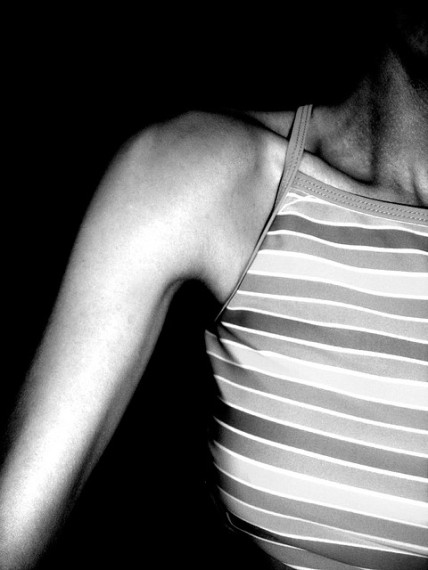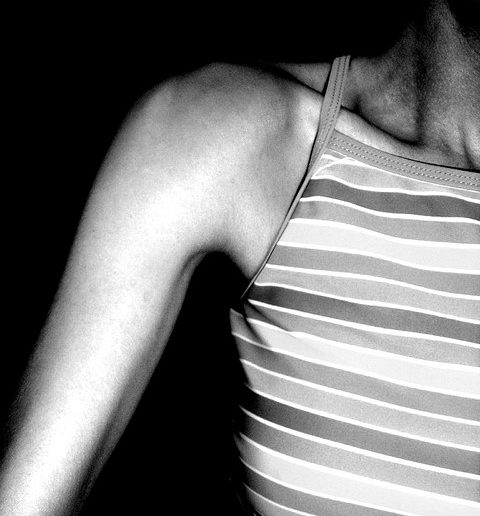
Anorexia. Photograph by st4rbucks
“What’s her problem?”
“Anorexia.” {Snort}. “As if that’s a real problem. Stupid girl.”
The nurses in the emergency room didn’t know I could hear them. My eating disorder had already robbed me of what little self-worth and dignity I had, and I believed every word they said. I spent my meagre income on pills intended to dull my appetite, give me energy, and purge my body of food. I got strange looks as I watched people eat but didn’t put a morsel of food in my own mouth. I forced myself to climb several flights of stairs each day to my apartment and office, despite being so exhausted that I had to rest at each landing. I hated myself for being too pathetic to start eating and even more for contemplating the idea.
Shoes squeaking, the nurse approached my gurney. “Why won’t you just eat?”
It seemed like a reasonable enough question. After all, I hadn’t eaten for several days, my organs were shutting down, my hair was falling out, and I was fainting several times a day. A normal person would have begun to eat long before. But for someone with anorexia nervosa, the concept of “just eat” was far from simple.
I was diagnosed with anorexia shortly before my 21st birthday, although I had begun restricting my food and exercising more several years before. In many ways, my story sounds like your stereotypical eating disorder saga: Young White Girl Feels Fat, Loses Weight, Can’t Stop, Whoops. But as I spent time in hospital wards and specialized treatment centres, the more I learned that these stereotypes were a load of crap. I met men with eating disorders, and minorities. Older women and children still in elementary school. I watched friends die because they couldn’t afford treatment and insurance wouldn’t pay. I was hospitalized with others who were underweight, normal weight, overweight, and even obese. We all had eating disorders.
People with anorexia are not the easiest people to treat. I found ways to squirrel food into my clothes to avoid eating it (if you’re desperate, you can easily fit an omelet in your sock). I argued and kicked up a fuss if I thought my apple was too big. I didn’t think I had a problem- you people had a problem. You people were just jealous. Eventually, the doctors and therapists threw up their hands in frustration. I had chosen my disorder, and until I un-chose it, there was nothing anyone could do.
Except, of course, I hadn’t chosen to have anorexia, any more than I could have chosen to have schizophrenia, diabetes, or cancer. I didn’t know that then. I had absorbed the ER nurse’s words: I was pathetic, foolish. Anorexia wasn’t a real problem. I should save the valuable hospital space for someone who was actually ill.
The consistent refusal of my health insurance to pay for my eating disorder treatment only reinforced this mindset. Treatment was “not medically necessary.” Because eating disorders are psychiatric illnesses with very real physical side effects, the behavioral and “regular” health insurance people kept punting my case back and forth like some warped game of hot potato. Cardiac problems meant I needed medical help. But the fact that I was suicidal and not eating meant I was a mental case. Literally. No one wanted to pay for what would likely be months of care, so they simply said that it wasn’t medically necessary. It was insurance-speak for “Pull yourself up by the bootstraps and stop being such a big baby.”
I was lucky: my parents and I managed to pool enough money to pay for seven months of intensive treatment at a facility specialized in eating disorders. But I relapsed shortly after I was discharged. With no money and no hope that insurance would pay for more treatment, I did the only thing I could think of. I swallowed several handfuls of pills in an attempt to end everything. My parents found me and rushed me to the hospital. Several weeks in critical care and a locked psychiatric unit, and I slowly began to emerge from my disorder.
I fought anorexia for over twelve years before I could finally say that my disease was in remission. Fighting an eating disorder is hard enough without having to fight misconceptions about the disease. I was afraid to disclose my history because of the comments that generally resulted. “Aren’t you a little old for that?” Or, “Those models are digitally altered, you know.” Gee, as if a card-carrying journalist really wasn’t aware of these things.
The most frustrating comments were when people told me they envied my disorder. “I wish I could have just a little anorexia. Fit back into those old jeans.” Tee hee. There’s no such thing as a little bit of anorexia. And no pair of jeans, no matter how hallowed, are worth having the crumbling bones of a 70-year-old while you’re still in your 30s. Or spending your 21st birthday in a locked psych ward because you weigh what you did when you were eight. I couldn’t even do a shot of Diet Coke. It’s not worth not eating (and digesting) your own birthday cake for a decade.
People think anorexia is desirable because all they see is the weight loss and not the accompanying mental torment. The weight loss isn’t the disorder; it’s a side effect of a compulsion to starve yourself, of a fear of food. Every bone in your body tells you that you should eat and eating is wrong. Recovery means not listening to this mental chatter. It means ignoring the cultural dictates that women should be thin, health be damned. It means changing the channel when yet another diet ad comes on promising a new you once you finally lose those extra pounds.
I know all too well that, no matter how much weight you lose, there you are.
An eating disorder isn’t something you get over, like the common cold. I can’t escape my disorder. I live every day knowing that I am just one skipped meal away from a long slide back into anorexia. It means I never skip meals, not ever. It means I don’t own a scale or count calories. It means I buy full-fat yoghurt. Accepting my biological predisposition to starve myself has been the one thing that keeps me sane.
At the end of the day, I have a life to live. Anorexia is no longer a part of that life. My horizons have expanded in tandem with my thighs and butt. And if you don’t like the size of my ass, well, you can just go kiss it.
Written by Carrie Arnold
Carrie Arnold is a freelance science writer living in Virginia. She is the author of “Decoding Anorexia: How Breakthroughs in Science Offer Hope for Eating Disorders,” and has written for a variety of magazines and online publications. When she is not writing, she is probably guzzling coffee, riding her bike, annoying her cat, or knitting.




